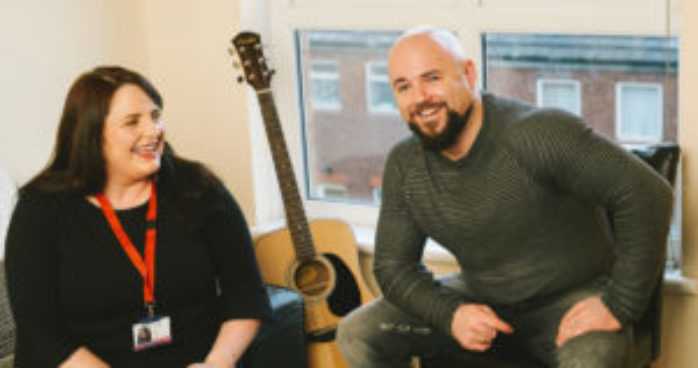
What is your role in Simon Community NI?
I work within Homeless Prevention as part of the HOME Team based in the Northern Ireland Housing Executive. This is a new role within the organisation, focusing on prevention, intervention and a solutions-based response to each specific client’s housing needs.
Why did you join Simon Community NI?
I was motivated to join Simon Community NI following my own family’s experience of the organisation. My uncle had struggled for many years with alcohol dependency and at his lowest point he turned away from family and turned to Simon Community NI. The staff within the organisation responded to his needs in a non-judgmental way, offering him unconditional support and encouragement, assisting him to move into his own tenancy and helping restore his dignity and self-worth. Having previously built a career within Estate Agency, I worked daily with individuals and families that so often were experiencing difficulties forcing them to sell or move home. I soon realised that my motivation was focused more on helping with the causal issues, than selling the property. This brought about the desire to change career and move to working within the voluntary sector. I have always had a heart for those experiencing homelessness – personally recognising that we all are only one life impacting event away from losing the place that we call home.
How do you think homelessness affects females specifically?
I feel that females have additional specific needs to men that homelessness can directly influence and control. If they are a mother, the difficulties leading to their homelessness can mean that their children are often taken into care and their parenting abilities scrutinised. This directly impacts their mental health and well-being, often causing the situation to worsen and initial difficulties experienced to become embedded e.g. debt, alcohol misuse. The escalated risks to those females forced to rough sleep mean that many will instead choose to enter precarious situations to secure somewhere to sleep. For example, returning to a violent ex-partner or accepting accommodation from someone who merely wants to use them as a commodity. Limited access to sanitary products and medical care can force a female to become socially isolated and lose all dignity. The survival instincts of the female and the mother mean that many can turn to prostitution as a method of existing, leading to an increased risk of abuse and violence. Most have exhausted all family relationships and instead they will turn to the ‘support’ of anyone who is simply considered a partner or friend by their presence.
What does International Women’s Day mean to you?
I believe I have the power and ability to influence and bring about change. This is because I was raised by a strong mother, who was raised by a strong independent mother. Both taught me I could be whatever I wanted to be and I was in control of my future. It’s in my genetic make-up to be a fighter and demand change for those marginalised and most vulnerable in society. I believe International Women’s Day is not only a day to celebrate all those strong, fierce women who have paved the path to the freedom I enjoy – but it’s also a call to rise up and continue to be the voice for those who are not heard. We need to learn the lessons of the past, but also ensure that we make changes that history doesn’t repeat itself. Looking at homelessness specifically, we need to create a female safe-space for those most at risk of exploitation and abuse and reconfigure our current services to respond specifically to the needs of the females we support.
To help us tailor our women’s support services please text FEMALE to 70660 & give £3 today. Thank you!